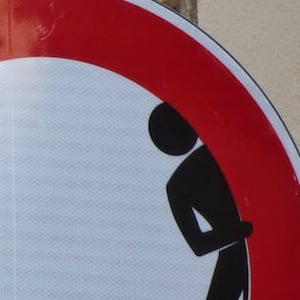bundle of laughs: Idiom Meaning and Origin
What does ‘bundle of laughs’ mean?
The idiom "bundle of laughs" refers to a person or situation that is amusing or enjoyable. It implies that being around this person or situation is likely to bring joy and laughter.

Idiom Explorer
The idiom *laugh up one's sleeve* means to secretly find amusement or satisfaction in a situation without showing it openly. It implies a hidden or sly sense of humor.
The idiom "laugh one's head off" means to laugh uncontrollably and excessively.
The idiom "laugh in one's sleeve" means to secretly or quietly find something amusing or funny without showing it openly.
The idiom "laughing stock" refers to a person or thing that is ridiculed and made fun of by others, causing amusement and laughter. It carries a negative connotation and is often associated with someone who is seen as absurd, ridiculous, or deserving of mockery.
The idiom "laugh a minute" refers to someone or something that is consistently funny or amusing, providing frequent moments of laughter.
The idiom "laugh all the way to the bank" means to feel a sense of satisfaction or joy when you have made a lot of money or have been successful in financial matters.
When someone is "in stitches," it means they are uncontrollably laughing or finding something extremely amusing.
The idiom "have a laugh" means to find something amusing or entertaining and to enjoy a good laugh or joke.
The idiom "have a good time" means to enjoy oneself or to have an enjoyable experience.
The idiom "have a ball" means to have a great time or enjoy oneself immensely.
The Laughter's Enigmatic Bundle
The idiom "bundle of laughs" is a colloquial expression that suggests amusement, often referring to someone or something that is considered humorous or entertaining. It is typically used in a sarcastic or ironic manner to convey the opposite sentiment, highlighting the lack of amusement or enjoyment in a particular situation or person.
One fact about this idiom is that it is considered informal and is commonly used in spoken language or informal writing. It may not be appropriate for use in formal or professional contexts, as it can be seen as too casual or flippant.
The phrase "bundle of laughs" is figurative in nature, comparing the subject or situation to a bundle or collection of laughter. This suggests that the person or situation is expected to bring joy or amusement, but instead, it falls short of these expectations.
The idiom "bundle of joy" is related to "bundle of laughs" as they both involve the concept of bundles. However, "bundle of joy" is used to describe the arrival of a baby or a happy event, while "bundle of laughs" is used to describe something that is not amusing or entertaining.
The idiom "barrel of laughs" is also related to "bundle of laughs" as they both convey a lack of amusement or enjoyment. However, "barrel of laughs" is often used to describe a situation or person that is highly entertaining or humorous, while "bundle of laughs" is used in a more sarcastic or ironic manner to highlight a lack of humor.
In contrast, the idiom "bundle of energy" is unrelated to "bundle of laughs" in terms of meaning. "Bundle of energy" is used to describe someone who is full of energy and enthusiasm, while "bundle of laughs" refers to something or someone that is not amusing or entertaining.
Similarly, the idiom "funny stuff" is unrelated to "bundle of laughs" in terms of meaning. "Funny stuff" is used to describe things that are humorous or amusing, while "bundle of laughs" is used in a sarcastic or ironic manner to convey the opposite sentiment.
The idiom "have a laugh" is somewhat related to "bundle of laughs" as they both involve the concept of laughter. However, "have a laugh" is used to invite or encourage someone to have a good time or enjoy themselves, while "bundle of laughs" is used to describe something or someone that is not amusing or entertaining.
Despite their differences, all of these idioms add to the richness and variety of the English language, allowing for more nuanced expression and communication.
It is important to note that the idiom "bundle of laughs" is a fixed phrase and should not be taken literally. The words "bundle" and "laughs" do not have individual meanings that relate directly to the idiom itself. Instead, their combination creates a metaphorical expression that conveys a specific message.
The origin and etymology of the idiom "bundle of laughs" are somewhat elusive and not well-documented. Despite extensive research, there is a lack of concrete information on the specific origins or earliest usage of this particular idiom. However, it is likely that the phrase developed over time through the natural evolution of language and common usage.
In the United States, the idiom "bundle of laughs" is understood by native English speakers and is often used to describe someone or something that is not enjoyable or entertaining. It is frequently used in a sarcastic or self-deprecating manner to express disappointment or frustration.
Overall, the idiom "bundle of laughs" encapsulates the concept of unmet expectations and ironic disappointment. While its exact origins may remain elusive, its usage and meaning are clear in contemporary American English.
Example usage
Examples of how the idiom "bundle of laughs" can be used in a sentence:
- She always has a smile on her face and is a real bundle of laughs.
- I wasn't expecting her to be so funny, she's a real bundle of laughs.
- That comedy show was a bundle of laughs from start to finish.
More "Humor" idioms



